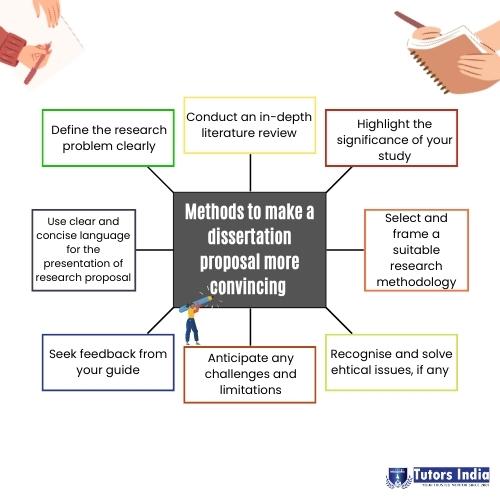How to ensure that the Research Proposal for the Masters dissertation is convincing enough?
Introduction
A research proposal could be defined as a written document that describes the intentions of a researcher for conducting a study. The research proposal is written before commencing the research, and it outlines the problem, the suggested approaches to solve the problem and an estimate of the cost incurred for the study. It can be said that a research proposal forms a two-way connection between the researcher and the authorities from whom the researcher seeks support. The primary objective of a research proposal is to convince the readers and the organisation that: –
- The problem is significant, and there is a need to conduct the research,
- The new technique of the research has a higher possibility of yielding results, and
- The researcher is competent enough to conduct the research (Vasanthakumari, 2021).
Students pursuing a Masters degree are often asked to write and submit a research proposal, or a dissertation proposal as a part of their dissertation. However, some may face challenges and fear whether their research is convincing enough.
Check here on how to write a dissertation proposal
Methods to make a dissertation proposal more convincing
A student must pay attention to various aspects of the research proposal to make it more convincing. The following tips may help to make the dissertation proposal more convincing-

- Define the research problem clearly- Start by clearly stating the research problem or question your study aims to address. This is done by choosing a relevant dissertation topic. A thorough review of the articles relevant to the field of study will help identify any knowledge gaps. Ensure it aligns with the research objectives and is measurable.
- Conduct a comprehensive literature review- A comprehensive literature review demonstrates your knowledge and understanding of the existing research in your field. Identify gaps or limitations in the literature and highlight how your research will contribute to filling those gaps or addressing those limitations. This will make the proposal more convincing (Barnes, 2019).
For step-by-step guidelines on literature review, click here.
- State how your study is significant- Clearly articulate the importance, impact and relevance of your research. Explain how your research will add to the existing knowledge or address the problem in real-life scenarios.
- Frame a methodology suitable for your research- Briefly mention the research methods you wish to implement. Explain why you have chosen this research methodology, how it will help answer the knowledge gaps and how it will help answer the research question. Mention the time duration planned for your study.
- Ethical considerations- Recognise and resolve any ethical issues concerning your research, especially if it incorporates human subjects. Describe how you plan to respect participant rights, confidentiality, and, if necessary, informed consent. Your dedication to ethical research is demonstrated by your use of ethical considerations (Reich, 2021).
- Identify any potential challenges and limitations- Anticipating any limitations or challenges creates an impression that you have critically thought of your research. In this section, also include how you plan to address those challenges.
- Feedback- Your mentor may offer valuable feedback once you share the proposal. They can identify any shortcomings and any areas for improvement. By working on the shortcomings, the proposal becomes more convincing and authentic.
- Presentation of the proposal- A student is usually asked to give a presentation on research proposal. By using clear and concise language, your ideas could be presented more effectively. Pay attention to the overall structure and make revisions if required to make the research proposal presentation more effective (Barnes, 2019).
Conclusion
Writing a well-presented and convincing research proposal helps a student to make it more convincing. You can increase the persuasiveness of your proposal by stating a research problem, conducting a thorough literature review, justifying the importance of your study, developing a sound methodology, addressing ethical considerations, foreseeing challenges, getting feedback, and ensuring clarity in presentation.
Our team of experts in Tutors India assist Masters students in dissertation writing in various disciplines. We help structure a research proposal format per the university requirements and ensure the services availed from us are error- and plagiarism-free.
References
Vasanthakumari, S. (2021). Writing research proposal. World Journal of Advanced Research and Reviews, 10(1), 184-190.
Gayle Pringle Barnes & Ming Cheng (2019) Working independently on the dissertation proposal: experiences of international Master’s students, Journal of Further and Higher Education, 43:8, 1120-1132, DOI: 10.1080/0309877X.2018.1450965
Justin Reich (2021) Preregistration and registered reports, Educational Psychologist, 56:2, 101-109, DOI: 10.1080/00461520.2021.1900851

 Next Post
Next Post